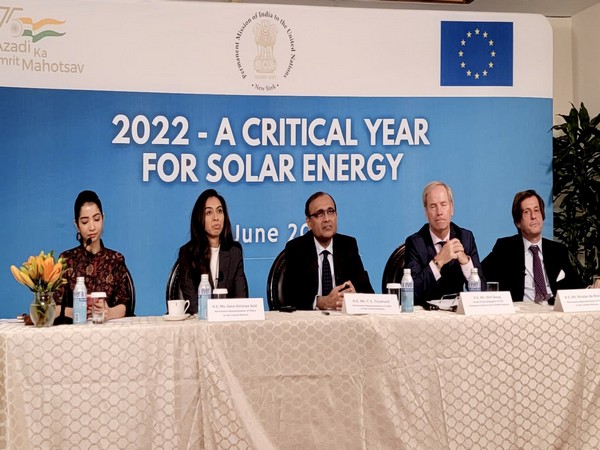New York [US], June 23 (ANI): Indian Permanent Representative to UN, Ambassador TS Tirumurti said that India is moving towards the target of non-fossil energy capacity of 500 GW as announced by Prime Minister Narendra Modi at COP26 Glasgow, Scotland.
This comes as Tirumurti co-hosted a virtual event with Olof Skoog, Ambassador, Head of the EU Delegation to the United Nations. The Theme of the event was “2022-A Critical Year for Solar Energy”. Ambassador of France Nicolas de Riviere, Ambassador of Palau Ilana Seid and International Solar Alliance Director-General Ajay Mathur also made their contributions during the event.
While addressing the event, Tirumurti highlighted that India has a clear vision that sustainable growth is possible only through sustainable energy sources.
“As announced at the COP26 in Glasgow by Prime Minister Narendra Modi, we are moving towards the target of non-fossil energy capacity of 500 GW. The share of renewable energy in the energy mix stands considerably enhanced to about 40 per cent,” India at UN said in a tweet quoting highlights of Tirumurti’s remarks.
India has over-achieved the 2022 targets for renewable energy. In less than 8 years, solar capacity has increased from around 2.6 GW to more than 46 GW. This has contributed in taking India to the 4th position globally for overall installed renewable energy capacity.
In this year’s budget, around 2.5 billion USD has been announced just for high-efficiency solar module manufacturing. There is also a huge market for solar stoves, which is necessary for India’s clean-cooking movement.
Indian start-ups have been instrumental in carrying forward the country’s solar ambitions. Architects and builders are also urged to work on the concept of solar trees in the construction of houses that could cater to 10-20 per cent of the household’s electricity needs.
Efforts have also been made to make solar power more accessible. Solar power tariff has been reduced by more than 75 per cent using plug and play model, and a record low solar tariff of less than 3 cents per unit has been achieved. “Along with energy production, energy storage and energy conservation are also important for sustainability; and we need to work together to find solutions to these issues,” Tirumurti stressed.
The Ambassador noted that the International Solar Alliance was conceived as a joint effort by India and France and last year in December, a resolution conferring Observer Status to the International Solar Alliance was adopted at the UN.
He said that at COP26 in Glasgow, the Prime Ministers of India and the United Kingdom launched the transnational grid initiative – the One Sun One World One Grid (OSOWOG) which is the first international network of global interconnected solar power grid. (ANI)












